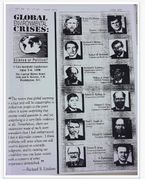Doing Nothing
Jump to navigation
Jump to search
“Kochland” Examines the Koch Brothers’ Early, Crucial Role in Climate-Change Denial
“Kochland” is important, Davies said, because it makes it clear that “you’d have a carbon tax, or something better, today, if not for the Kochs. They stopped anything from happening back when there was still time.” The book also documents how, in 2010, the company’s lobbyists spent gobs of cash and swarmed Congress as part of a multi-pronged effort to kill the first, and so far the last, serious effort to place a price on carbon pollution—the proposed “cap and trade” bill. Magnifying the Kochs’ power was their network of allied donors, anonymously funded shell groups, think tanks, academic centers, and nonprofit advocacy groups, which Koch insiders referred to as their “echo chamber.” Leonard also reports that the centrist think tank Third Way quietly worked with the Kochs to push back against efforts to renegotiate the North American Free Trade Agreement, which could have affected their business importing oil from Canada. Frequently, and by design, the Koch brothers’ involvement was all but invisible
Others have chronicled the cap-and-trade fight well, but Leonard penetrates the inner sanctum of the Kochs’ lobbying machine, showing that, from the start, even when other parts of the company could have benefitted from an embrace of alternative energy, Koch Industries regarded any compromise that might reduce fossil-fuel consumption as unacceptable. Protecting its fossil-fuel profits was, and remains, the company’s top political priority. Leonard shows that the Kochs, to achieve this end, worked to hijack the Tea Party movement and, eventually, the Republican Party itself.
Scientists who worked for Koch Industries adopted the company line; Leonard quotes a former company scientist, who embraced the conspiracy theory that élites invented a global-warming “hoax” as a way to unite Americans against a common enemy after the Cold War. Leonard also quotes Philip Ellender, Koch Industries’ top lobbyist, as claiming, in 2014, that the Earth had gotten cooler in the previous eighteen years. In fact, according to nasa, eighteen of the nineteen hottest years on record have occurred in the past two decades. Yet the Koch machine bought its way into Congress and turned climate-change denial into an unchallengeable Republican talking point. Meanwhile, after the cap-and-trade bill died, the planet continued heating, and the Kochs’ net worth doubled.
Koch Bros funded Conference 1991
Cato Institute Brochure 6/05/1991
One of the earliest samples of climate denialism. Probably the turning point of the Republican Party's adoption of climate denialism and the Koch Bros' libertarian agenda.
Fossil fuel production on track for double the safe climate limit
<embed>https://www.theguardian.com/environment/2019/nov/20/fossil-fuel-production-on-track-for-double-the-safe-climate-limit</embed>
The world’s nations are on track to produce more than twice as much coal, oil and gas as can be burned in 2030 while restricting rise in the global temperature to 1.5C, analysis shows.
The report is the first to compare countries’ stated plans for fossil fuel extraction with the goals of the Paris climate agreement, which is to keep global heating well below 2C above pre-industrial levels, and to aim for 1.5C. It exposes a huge gap, with fossil fuel production in 2030 heading for 50% more than is consistent with 2C, and 120% more than that for 1.5C.
The report was produced by the UN Environment Programme and a coalition of research organisations. It complements an earlier UN analysis showing the current Paris agreement pledges to cut emissions would still lead to a catastrophic 3-4C rise.
Yes, the Climate Crisis May Wipe out Six Billion People
<embed>https://thetyee.ca/Analysis/2019/09/18/Climate-Crisis-Wipe-Out/</embed>
One thing the climate crisis underscores is that Homo sapiens are not primarily a rational species. When forced to make important decisions, particularly decisions affecting our economic security or socio-political status, primitive instinct and raw emotion tend to take the upper hand. This is not a good thing if the fate of society is at stake. Take “hope” for example. For good evolutionary reasons, humans naturally tend to be hopeful in times of stress. So gently comforting is this word, that some even endow their daughters with its name. But hope can be enervating, flat out debilitating, when it merges with mere wishful thinking — when we hope, for example, that technology alone can save us from climate change.
Laissez-faire: the Environmental Version
<embed>https://ecooptimism.com/?p=1200</embed>
The Center for the Advancement of the Steady State Economy, caught my eye: “Laissez-faire takes on a new meaning — it is the ecosystem, not the economy that must be “left alone” to manage itself and evolve by its own rules.”

